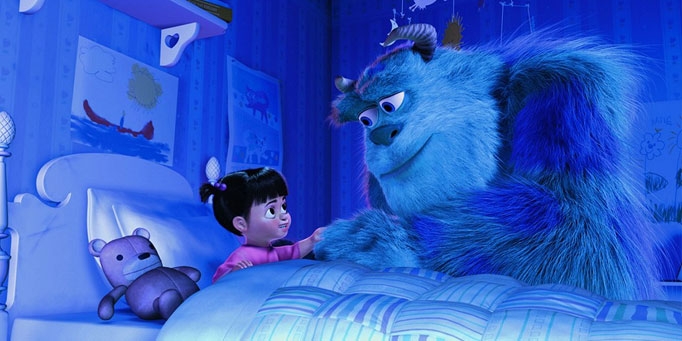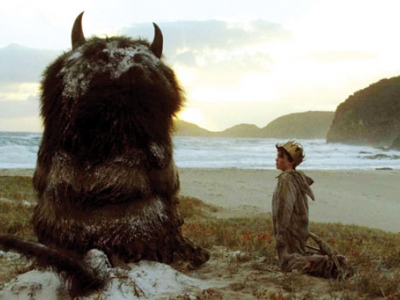
God created the monsters
As I started preparing to teach on Genesis, I came across a verse that made me uncomfortable.
Next semester I get to teach Genesis 1-11 at Youthworks College. I must admit that it is a bit of a highlight for me, but then again this semester I am teaching a Family Ministry unit and that is a highlight too. In In preparing for my talks on Genesis, I have been turning my mind to those foundational passages once again. Perhaps it is because I’m still also thinking about family ministry, perhaps it is because I’m also in the process of marking assignments for a children’s ministry unit, or because I’m still mulling over the material from the Theology of Children’s Ministry Conference we held last year that looked at engaging children with engaging stories, but one way or another my gaze has landed upon the line "So God created the great creatures of the sea…".
As I reflect on this line and ask myself "what does it mean and why is it included?", I keep running into problems. The line seems innocent enough in the NIV and makes me think of walruses and narwhales, orca and giant squid. But the trouble is I don’t think that the translation committee has done us any favours in the first part of Genesis 1:21. It seems to me that no matter how we dress it up the line is actually saying something that my empirically trained, Western, Enlightenment mind does not want it to say. I can’t help thinking that the sentence should begin "So God created the great sea monsters…".
Normally I’d put this sort of aberration down to my ignorance, my lack of understanding of biblical culture or my poor grasp of the technicalities of the language. I want to do the same again this time, because the alternative is that I come to terms with the fact that Genesis 1 says that God created things that have never existed.
Perhaps there’s a way out. Perhaps I could get round it by dragging out those books on dinosaurs (yes, alright then, marine creatures that lived during the Triassic, Jurassic and Cretaceous periods) or by appealing to the incompleteness of the fossil record. But somehow I can’t avoid the suspicion that this is not good enough and does not do justice to the importance of what I would otherwise say is one of the foundational passages of the Bible. I could kid myself that there is no problem here. I’d be in good company. I could say there really is no mythological connotation here, as the New International Dictionary of Old Testament Theology and Exegesis does, and then in the next breath it admits that the Leviathan was one of the great sea monsters. The Leviathan, that’s the one that snorts out light and breaths out fire (Job 41:18-19). Nothing mythological about that.
Let me stop for a moment and consider my options.
i. Genesis has got it wrong
ii. Job has got it wrong
iii. Genesis and Job have got it wrong
iv. I’m coming about this the wrong way
On a number of levels the first three options sound quite good. I am, after all, the expert on Genesis 1. I’m the one who is going to be teaching it to others at college. If I don’t know what it says, what hope have they got? But I’ve got this nagging memory in the back of my mind that whenever I have taken the plunge and adjusted an earlier understanding to accommodate a newer understanding of the biblical text, then things have suddenly opened up and made more sense, and fitted more coherently together not less.
OK so I’ve become accustomed to thinking that God created everything that exists, but what would it mean if Genesis 1 also covers a whole heap of things that only exist in myths and legends? What if Genesis 1 does not simply want to say that God is the unrivalled sovereign over the world that he made, but it also wants to reassure us that he is unrivalled sovereign over the world that we inhabit as well. Cue Reepicheep.
If you’ve never met him before let me explain that Reepicheep is a mouse. But he is no ordinary mouse. He is a speaking mouse. He is a Narnian mouse, and a champion amongst all true Narnians. In C. S. Lewis’s Voyage of the Dawntreader Caspian, the king, undertakes a voyage in order to find seven lost lords of Narnia. At one point in the journey the Dawntreader sails into a dark cloud, a pitch dark cloud. The ship’s crew are uneasy but they proceed until they pick up a figure who has swum out to them from an island still shrouded in blackness. He tells them to fly, that the island is a place where dreams come true. It sounds appealing, at first, until the sailors realise that it is a place where nightmares also come true. They fall over themselves to turn the ship about and to retreat as fast as they can. Reepicheep cannot understand it. This is stupidity. This is undignified and pathetic. There is absolutely no reason, he argues, to be fearful of your imagination.
I’m with Reepicheep, in the day and when it’s other people’s anxieties and other people’s concerns, that is. But if Genesis 1 says God created the great sea monsters then it would seem that he is much more sympathetic to the plight of the sailors in the story. I’m also with Pete Docter, Jill Culton and the other creators of Pixar’s Monster’s Inc. who seem to be saying that when you see monsters in the light of day, and understand their needs, desires, weakness and limitations, then you will see that there’s really no reason to be fearful of them at all. But if Genesis 1 says God created the great sea monsters then it would seem that he takes our imaginations seriously and wants to be available to us and to provide for us emotionally no less than he wants to make sure that our physical and social needs are taken care of.
Genesis 1 tells me that God created the great sea monsters. It is proof that this is a silly story of a naïve people or, among other things, it invites me to take the concerns of my children seriously when they insist that there is a monster under the bed, in the curtains or behind the cupboard. It also tells me that my response is not, “Don’t be silly, there’s no such thing as monsters.” If I think that Genesis 1 is on to something, my response to them should run more along the lines of, “Do you know who’s boss of the monsters? God is. Shall we thank him that he’s in charge of even the biggest, baddest monsters? And shall we ask him to keep us safe from the monsters? Let's do that.”
For more articles from Growing Faith, subscribe to our monthly e-newsletter.
To hear about the latest books and resources from Youthworks Media, subscribe here.








